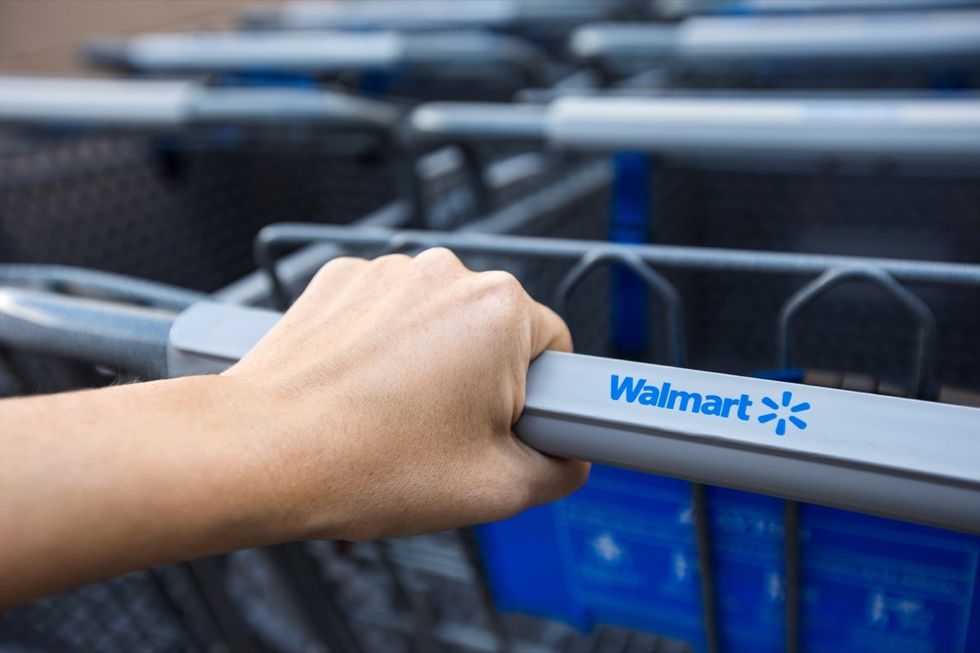When it comes to shopping at Walmart, we can find almost anything we need. But the retailer's vast product selection hasn't allowed it to escape scrutiny. In just the past few months, Walmart has been hit with lawsuits over allegations of things like overcharging customers and selling potentially toxic spices. And now, the retailer is facing legal issues once again—this time for selling certain shirts, bras, blankets, and pillows. Read on to find out why Walmart is being accused of falsely advertising these products.
READ THIS NEXT: Walmart Slammed for New Shopping Features in Stores and Online.
A new lawsuit has been filed against Walmart.
 Shutterstock
ShutterstockAre Walmart's eco-friendly products actually good for the environment? At least one shopper is now saying no. On March 30, plaintiff Grace Toledofiled a lawsuit against the company in the U.S. District Court of Massachusetts over this issue. According to the suit, Toledo alleges that Walmart has "falsely marketed" certain products as bamboo. The plaintiff claims that the retailer sells shirts, bras, blankets, and pillows that are "deceptively" labeled as "100 percent bamboo" or "made from 100 precent natural bamboo fibers."
The lawsuit cited several specific products that use this type of labeling that were sold both in-store and online by Walmart and its sister chain Sam's Club: the Ottomanson Bamboo Luxury Bath Towel Set; Bamboo Sheets—Sweet Home Collection 1800 Series Deep Pocket 4 Piece Set; Pine & River Chilled Bamboo Cooling Weighted Blanket; LUXE Life 100% Organic Bamboo Washcloths for Babies and Adults; Sweet Home Collection Hypoallergenic Bamboo Memory Foam Pillow; Home Trends 300 Thread Count Bamboo Sheets; Serenity Organic Self—Cooling Luxury Bamboo Comforter; and the No Boundaries—Juniors Eco-Friendly Stripe Tee Shirt.
The plaintiff claims these bamboo products are actually made with rayon.
 Shutterstock
ShutterstockAccording to the lawsuit, these products are not actually 100 percent bamboo. Toledo alleges that several of the products marketed and advertised in this way are actually made with the textile fiber rayon. This is a "type of regenerated or manufactured fiber made from cellulose," the suit states. "Manufacturers may use many different plants as cellulose precursors to make rayon, including cotton linters (short cotton fibers), wood pulp, and bamboo," Toledo asserts. "Regardless of the source of the cellulose, the manufacturing process involves the use of hazardous chemicals, and the resulting fiber is rayon—not cotton, wood, or bamboo fiber."
The class action alleges that per the Federal Trade Commission's (FTC) Textile Products Identification Act, Walmart must disclose the use of "rayon" in these products instead of marketing them as being made with bamboo. When Best Life reached out to Walmart about this case, a spokesperson responded with a statement from the company. "We are committed to being the most trusted retailer and take these claims seriously," they stated. "We have comprehensive product description programs that we continually review, and we expect our suppliers to provide products that comply with all laws, including those around labeling. We are reviewing the complaint and will respond in court as appropriate."
She claims she purchased a pillow from Walmart under this guise.
 Shutterstock
ShutterstockWalmart is allegedly "misleading" consumers into believing they are buying "eco-friendly" and "sustainable" products in order to make a profit that it might not otherwise, according to the lawsuit. As explained in the case, Toledo purchased a pillow marketed as being made "with bamboo" from a Walmart in Avon, Massachusetts, in 2019. As a result of this label, the plaintiff claims that she was lead into "reasonably believing that it was made from fibers taken directly from the bamboo plant," but it was actually made with rayon.
"Toldeo would not have purchased the product, or would have paid significantly less for the product, had she known that the product was not made with bamboo fibers," the lawsuit states.
This is not the first time Walmart has come under fire for this same issue.
 Alexanderstock23 / Shutterstock
Alexanderstock23 / ShutterstockThe company has been previously criticized for its bamboo marketing in the past as well. In April 2022, the FTC actually filed a lawsuit against both Walmart and Kohl's for falsely implying that certain products were made with environmentally-friendly bamboo when they were made with rayon. According to the FTC suit, Walmart has been made aware about this problem since 2010 and has even received a warning letter about it.
"Since at least 2015, despite the commission’s public announcements and the warning letter, Defendant has marketed and sold rayon textile fiber products advertised as 'bamboo,'" the agency alleged in its lawsuit.





